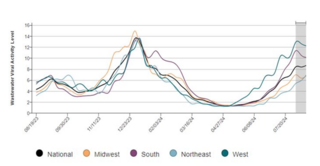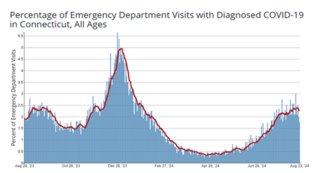Hospitalizations are trending up and are higher than this time last year, but lower than two years ago.
Keep in mind
- Declining immunity is an important contributor to the increase in cases. Protection against new infection wanes significantly 3-4 months after the last vaccine dose or infection.
- New variants continue to emerge, any of which could allow the virus to evade current levels of immunity and increase the risk of reinfection.
- Most cases of COVID are described as a “bad cold” and resolve fully, particularly in younger people and those with intact immune systems.
- Long COVID continues to complicate some COVID infections, including mild cases.
- Though anyone can be affected, people at particular risk include those with more severe COVID infections, women, Hispanic and Latino people, people with certain underlying health conditions, and those experiencing health inequities.
- Long COVID can cause fatigue that interferes with daily life, trouble concentrating, dizziness upon standing, and many other symptoms.
- Vaccination against COVID reduces the risk of long COVID. Of course, the best way to avoid it is to take steps to avoid infection.
Yale’s COVID policies
Yale is following the CDC’s 2024 revised guidance for any respiratory infection, including COVID. Right now, COVID is the most likely cause of a respiratory infection.
If you develop any respiratory symptoms:
- Mask, stay home or in your dorm room, and consider performing a COVID test (more below).
- Do not go to classes, work, or eat in the dining hall until you have been fever-free for 24 hours without fever-lowering medications AND your symptoms are clearly improving.
- Once you are feeling better, you may return to routine activities but take additional precautions for 5 days as you may still be infectious: wear a well-fitting mask, take steps to improve airflow, distance from others, and wash your hands frequently.
- Contact your healthcare provider for consideration of treatment if you are over age 50, at increased risk due to obesity or other condition, have an underlying weakened immune system, or are experiencing severe symptoms (such as high fever, shortness of breath, vomiting).
- 2024COVID Quick Guide for Students includes helpful tips for students navigating a possible case of COVID.
- Healthcare workers who test positive for COVID are still required to isolate for 7 days following symptom onset, returning to work on day 8. Testing is recommended prior to returning to work; please remain at home if you have ongoing symptoms or continue to test positive on or after day 7.
What about COVID testing?
While not required, we suggest testing when feasible, especially if you are at increased risk of more severe COVID (over age 50, immunocompromised, or with certain conditions), are a candidate for anti-viral treatment, if you live with high-risk individuals, or if you are a healthcare worker.
- If your test is negative, it does not necessarily mean you don’t have COVID! Tests can be falsely negative early in infection and another test in 48 hours is needed. While you are symptomatic you should remain masked and isolated according to the guidance above regardless of test results.
- Tests are available at residential colleges and in other designated locations on campus while supplies last.
- Tests may be purchased at the Yale Health pharmacy for $5, about half the current retail cost.
If you have been exposed
You may attend class or work if you have no symptoms but should monitor yourself closely and isolate as outlined above if symptoms develop.
If you share a household or suite with someone who has symptoms or tested positive, mask when at home. If you share a bedroom, consider moving into a common room or staying with a friend for a few days. Take steps for cleaner air and wash hands frequently.
Prevention, prevention, prevention
Masking works! Masks are recommended for those with a weakened immune system, in crowds, in poorly ventilated places, for close contacts, or if it is just your preference. For students, masks are available at your school or residential college. Employees, ask your supervisor or lead administrator.
Vaccinate!
The updated 2024-2025 COVID vaccine will be available soon at Yale (details in early September). The updated vaccine, based on the KP2 variant, will provide improved protection against the currently circulating variants.
- All faculty, staff, and students are strongly encouraged to take advantage of this free vaccine when it becomes available. As of late June, CDC has recommended that everyone aged 6 months or older receive a 2024-2025 COVID vaccine.
- Vaccination reduces (but does not eliminate) the risk of infection, reduces the severity of infection for those who may become infected, and reduces the risk of transmission to vulnerable others.
- Vaccination reduces the risk of long COVID.
- Vaccination appointments may be scheduled through Yale Health. Details will be available shortly after Labor Day.
- Hot off the press: the CDC has shortened the interval between doses to 2 months, so those who had a dose of 2023-24 vaccine this summer may receive the updated vaccine as early as 8 weeks later.
We have the tools to manage COVID and reduce the likelihood that it will disrupt our lives. While most requirements are gone, we all need to do our part to keep campus as safe as it can reasonably be. Many thanks to all of you!
Be well,
Madeline Wilson, MD
Chief Campus Health Officer

